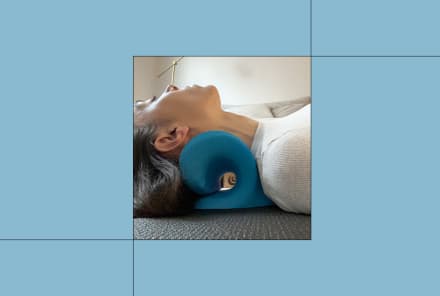Advertisement
A Sleep Medicine Psychologist Shares 3 Sleep Myths We Need To Stop Believing


We all sleep—but how many of us sleep exceptionally well, night after night? Very few, I'd wager, which is why we have board-certified behavioral sleep medicine psychologist Jade Wu, Ph.D., DBSM, author of Hello Sleep, on this episode of the mindbodygreen podcast to drop her expert knowledge on every sleep issue keeping you from dreamland.
But before we can discuss must-have tips, we first need to weed out the common misconceptions. Here, Wu shares the myths you need to stop believing for the sake of your sleep schedule.
Myth 1: Going to bed early is always good
Take it from Wu: "We don't want to go to bed too early." See, hitting the hay before you have accrued enough sleep drive (aka your desire to sleep throughout the day) can backfire and result in even more tossing and turning. This, Wu says, creates a strained relationship between you and your bed.
"The more you're awake tossing, turning, and frustrated, the more you're learning that sleep is a frustrating thing and your bed is an anxiety-producing place," she shares.
"Then the next time you get into bed, your brain's going to say, 'Oh, I know what this place is. This is where we struggle and get frustrated and get anxious.'" It often leads to a vicious cycle, she says, in which your brain fires up the fight-or-flight response just as you tuck into crisp sheets.
"So for people who are having trouble falling asleep, one of the quickest ways to reset is to go to bed later, when you're actually really sleepy," she notes. "Make sure your body actually has a chance to feel that sleepiness by having a relaxing wind-down routine."
To be clear, going to bed early isn't necessarily a bad thing—assuming you actually feel tired. But if you're wired, don't try to force it.
Myth 2: Napping is always bad
Some sleep experts have a strong anti-nap POV, but according to Wu, napping does have a place in a healthy sleep schedule so long as you do so responsibly.
"Napping could be a double-edged sword," she says. On the one hand, it can really help people catch up on sleep they aren't getting at night.
"I think napping is just such a fabulous elixir of life that we get to have in the middle of the day," she notes. "If you're having a terrible night of insomnia, you can reassure yourself by saying, 'Well, at least I can catch up a little bit tomorrow with my nap.' So maybe that takes some of the pressure off [sleep] and makes you less anxious."
Now, the problem arises when you nap too late or for too long—that takes away from your overall sleep appetite. "By being awake and active, hopefully by bedtime you saved up enough to buy yourself a good night's sleep," Wu explains. "What you're doing by taking a big, long nap, especially late in the day, is taking away some of the appetite. It's like eating multiple cupcakes right before dinner."
So, what does she suggest for a healthy nap? She recommends starting your nap about six to eight hours after you wake up for the day and keeping it to around 30 minutes. "No more than an hour," she advises.
Myth 3: The more sleep hacks, the better
For a lot of people, especially those who struggle with insomnia, a big roadblock to deep sleep is simply trying too hard. Sleep should feel effortless, says Wu, and trying too many tips and tricks at once can ultimately backfire.
"Whether it's counting sheep, [putting your head] in the freezer, meditating, or whatever it is—you're trying too hard," she explains. "Anything you're doing to try really hard to get to sleep is going to put more of a spotlight on the fact that you're not sleeping and put more pressure on yourself to get to sleep."
Rather, if you find yourself tossing and turning, do something you naturally enjoy. Read a book, watch TV… Even pulling out your phone can be OK, says Wu, as long as it takes your mind off the sleep anxiety. (But if doomscrolling gives you more stimulation and stress, it's probably best to keep the phone away.) "Any of that is going to give you less stimulation than what you were doing before, which is trying really hard to sleep," she notes.
That said, sometimes a great sleep hack can really move the needle for your sleep schedule. That's fine! Just don't put too much pressure on yourself to commit to every trick in the book, Wu says.
The takeaway
We love a good sleep tip, but Wu says there is no silver bullet for a great night's sleep (and we definitely agree). "Quality of sleep is multifaceted. It's not just one thing that we can boil down to," she adds.
That said, it does help to sort out what doesn't work before diving into the best sleep hygiene advice. That way, you'll be well-equipped to make the right decisions for your own bedtime regimen.
Want the latest and greatest from leading well-being experts? Subscribe to The mindbodygreen Podcast on Apple Podcasts.
Watch Next
Enjoy some of our favorite clips from classes
Enjoy some of our favorite clips from classes
What Is Meditation?
Mindfulness/Spirituality | Light Watkins
Box Breathing
Mindfulness/Spirituality | Gwen Dittmar
What Breathwork Can Address
Mindfulness/Spirituality | Gwen Dittmar
The 8 Limbs of Yoga - What is Asana?
Yoga | Caley Alyssa
Two Standing Postures to Open Up Tight Hips
Yoga | Caley Alyssa
How Plants Can Optimize Athletic Performance
Nutrition | Rich Roll
What to Eat Before a Workout
Nutrition | Rich Roll
How Ayurveda Helps Us Navigate Modern Life
Nutrition | Sahara Rose
Messages About Love & Relationships
Love & Relationships | Esther Perel
Love Languages
Love & Relationships | Esther Perel
What Is Meditation?
Box Breathing
What Breathwork Can Address
The 8 Limbs of Yoga - What is Asana?
Two Standing Postures to Open Up Tight Hips
How Plants Can Optimize Athletic Performance
What to Eat Before a Workout
How Ayurveda Helps Us Navigate Modern Life
Messages About Love & Relationships
Love Languages
Advertisement

This Gave Me Osteoporosis At 32 & Here's What I Wish People Knew
AmiCietta Duche Clarke

New Study Shows This Vitamin May Lower Your Risk Of Alzheimer’s By 17%
Molly Knudsen, M.S., RDN

This Gave Me Osteoporosis At 32 & Here's What I Wish People Knew
AmiCietta Duche Clarke

New Study Shows This Vitamin May Lower Your Risk Of Alzheimer’s By 17%
Molly Knudsen, M.S., RDN













